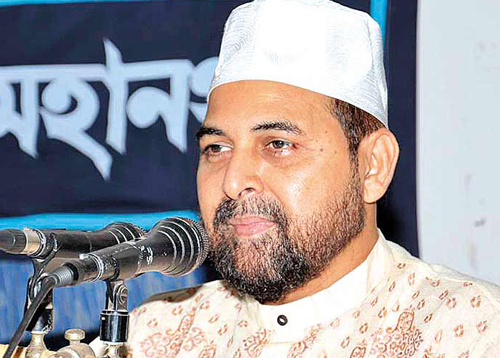
Much of this violence is being attributed to the Jamaat-e-Islami. Is that correct?
The violence is being attributed to Jamaat-e-Islami without any justification. BJI is a lawful political party with representation in Parliament. For the last three years, BJI has not being given permission to organize peaceful meetings and protests. All its party offices are controlled by the security forces. Nobody is allowed to go into the party office without the consent of police. Party leaders and activists are being indiscriminately arrested. Every time the BJI has organized a peaceful protest, the police have fired upon the unarmed and peaceful protestors. It is the police that are causing the violence.
Do you respect the verdict of the International Crimes Tribunal (ICT) against the accused BJI leaders?
The ICT proceedings are totally flawed. This is not only my opinion but that of the international community as well. Human Rights Watch, Amnesty International, International Bar Association and a number of others have expressed such views. Even the former attorney general of India has opined that the Act under which the ICT operates is 'ultra virus” to the Constitution of Bangladesh. Many of them have asked for a retrial following the resignation of some of the judges of the Tribunal and appointment of new members in it. Therefore, the ICT has lost all credibility. Even though our attempt for a retrial was rejected we will still go for an appeal to the Supreme Court against the verdict.
Jamaat-e-Islami had opposed the break-up of Pakistan and was against the creation of Bangladesh. When you look back do you regret having taken that stand?
Jamaat-e-Islami had politically opposed the breakup of Pakistan in the same way the Indian National Congress had opposed the division of India in 1947. It was a political act by BJI. The leadership of BJI was in no way involved with the war crimes or “crimes against humanity” as alleged or otherwise.
Many people see the Jamaat-e-Islami as a subversive and religious fundamentalist force and feel that it has no place in a democracy like Bangladesh. How do you react to that?
Jamaat-e-Islami is a democratic political party with Islamic values as its ideals. It wants to establish social, economic and political justice. It is the only political party in Bangladesh which practices intra-party democracy. Its Ameer (head) is elected every four years and its district committee members are elected every two years. BJI believes in constitutionalism and rule of law. It has participated in all the elections in Bangladesh since 1979 and has representations in all parliaments since then.
What are the chances of the Jamaat-e-Islami being banned as an organization? How will you react if that does happen?
In the event BJI is banned as a political party, we will challenge the ban before the High Court and thereafter in the Supreme Court of Bangladesh. We will act in a dignified and in a Constitutional manner.
What has been the impact of BJI in Bangladesh so far and what fundamental changes have you brought in the country?
Corruption is endemic in Bangladesh and it hinders Bangladesh's growth and prosperity. Even the arch enemy of BJI praises its leadership for being honest. The two ministers of the BJI in the last BNP-BJI coalition government had earned the reputation of being competent and un-corrupt.
Why are your relations with the Awami League so hostile? You did work with each other in past, why has it become so hostile now?
During the democratic movement in the '80s, and the movement for incorporating the care taker Government in the Constitution, in the mid 90s, BJI and Awami League had fought hand in hand. Awami League has turned against BJI only because of its partnership with Bangladesh Nationalist Party. This Partnership is perceived by Awami League as a threat that can stop it from coming to power.
How are your relations with the US which has been waging a global war on terror against many Islamic organizations and other European countries?
Our relationship with the countries of the European Union and United States is a cordial one. Our representatives are regular visitors to the UK & USA. We are also in contact with the civil society of these two countries. Occasionally we also send our representatives to visit other European Countries as well.
You did enjoy close relations with Pakistan at one time, how are your relations now?
BJI believes in friendly relationship with all the countries.
The Jamaat-e-Islami is seen in India as an anti-Indian force which is committed to spreading hatred and anti-Indian feelings among the people of Bangladesh. Shouldn't India be worried about the Jamaat in Bangladesh?
India is a big country and a neighbour. You cannot change your neighbour and you should not ignore your neighbour. BJI always wants friendly relationship with India on the basis of mutual respect and trust. This trust can only be built if the outstanding problems between the two countries namely: exchange of territories, water sharing, border trade, International trade etc are solved fairly and justly. BJI would be very happy to engage with Indian establishment and Indian civil society.
Could you explain why among others, Hindus are being targeted by the Jamaat cadres?
It is a travesty of truth to say that Hindus are being targeted by BJI members. It is quite the contrary. In time of need, BJI has always stood by its Hindu brothers and sisters who are respectable citizens of Bangladesh. BJI in its recent statement has condemned the attack on Hindus and in their temples. It has asked its work force to protect the life and property of Hindus and all other religious and ethnic minorities.
What kind of relations do you see with India in future?
Good, friendly, working and neighbourly relationship.






Comments
Add new comment